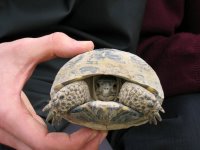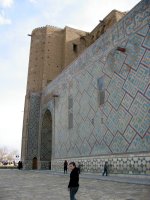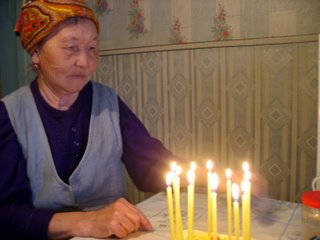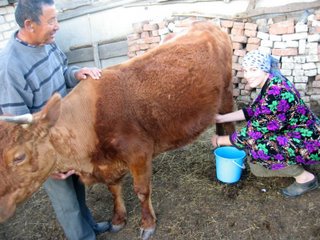Thursday, July 13, 2006
Wednesday, July 05, 2006
things I miss

I've been home for a month now, searching for the flash drive with all my journals on it. So I thought it was time to try to re-create what I wrote the last few weeks in KZ. I'll start with this:
Things I miss about Kazakhstan
- the stars at night, so clear I could see the band of the Milky Way
- the fruit juices. Piko Apple, Piko Plum, Sad White Grape
- Buses that cost about 18 cents (I don't mean the buses themselves, just that they cost 18 cents and not 2 dollars)
- cooking and eating outside in the summer
- the mountains near Koktube Eki
- being able to stop by my friends' houses anytime
- tea time
- my friends from my church, from Podstepnoye, and from Uralsk
- cherries and apricots enough to carpet the streets (Koktube Eki)
- how thrilling it was to get emails and packages
Sunday, June 04, 2006
almost the last one
I have a few hours left in Kazakhstan, and I'm a little busy . . . . But I intend to post a few more blogs over the next few days to wrap this up.
Tuesday, May 09, 2006
fish
Kanipa Apa and her friend (in her late 60’s) are trying to give a fishhead to the kitten Kanipa threw last night. They’re having fun, laughing and jogging around the house in the wide-kneed flat-footed way older ladies run here (I know because they run to catch buses). One of them is trying to get it out of Big Cat’s jaws and the other is chasing the kitten, who is happier about having someone to play with than about a fish head.
Thursday, April 27, 2006
goat games, etc.
Nauriz, the Central Asian new year, was March 22. Karen, Dawn, Amber, and I took a taxi to downtown Turkistan, never doubting that there would be stuff going on there. A chilly wind was blowing through the center. Empty. So, there we were, in something a little like sleet. Somehow, three of Karen’s students spotted us from across the street. The crossed over to us and suggested we go to the hippodrome. But at this point, the conversation broke down, and the girls stood there, looking around. They were waiting for someone else to make the first move. But to where?
So we started walking in a direction we thought might be good and stood at the bus stop for a few minutes before Karen suggested we first go to the bazaar and try to find a shuttle. It worked.
We got off at the bazaar and went toward the taxi drivers shouting “hippodrome!” Apparently, all the vans were going to the hippodrome instead of following their routes. We got in a van and waited for a few more passengers. I realized, as I hadn’t in my frustration at the empty city, our inefficiency, and the weather, that the girls were about to burst with excitement. It turned out that none of them had ever been to the traditional horse games. They always had to wait on guests at home. I don’t know how they’d escaped, because one of them said she was supposed to be helping out at that moment, but I have a feeling that they all went home to piles of dishes and drunk old ladies playing cards.
Our van joined a long chain of white vans off-roading toward a scooped-out green field below a hill. The hill was full of people – the whole city - the young men wearing jeans with black leather jackets and black hats, the few women who were there mostly wearing long skirts and scarves. We sure stood out in the crowds of dark-haired, black-eyed people. They were selling shashlik and pilaf at giant tables (it looked a little like those festivals in Breugel, but Central Asian) We spread ourselves wide and thick, taking photos with people we didn’t know, pretending to stir the pilaf in giant cauldrons, petting horses.
We went up and stood on the hill to watch the first races. The only clear sounds were the wind and the samachki (sunflower seeds, sold on every street corner, eaten in bushels by Kz nationals). The horses raced. An enthusiastic dog beat a few of them. This isn’t the pros, after all. The horses generally hadn’t been washed or brushed; some of them had blankets for saddles. I suppose some of them had just been taken out of the herd for the event. We watched kokpar, the game with the goat carcass. From a distance it was much slower than I’d imagined. At the center of the field, the horses would be close together, not going anywhere. What was going on is that the guys were beating each other with their riding whips and fighting over the carcass. Then, one would break away with the carcass, riding toward a pole, and maybe one or two other horsemen would follow him. One of the winners rode past us. He was sitting sideways on his horse, his feet hooked under the carcass to hold it up, his riding whip in his mouth and a felt and fur hat on over one eyebrow. But we had had enough fun; we were cold and went to the bazaar, where I made the first of several wise but unweildy purchases.
Sunday, April 16, 2006
Turkistan
When I got off the train in Turkistan, the difference between this place and Uralsk hit me like a breaker. The train was like a section of Uralsk; we'd just carried it south with us. Turkistan was warm, green, spring, very very Central Asian. I don’t look so out of place in Uralsk or in my village (I mean my face, not my clothes), but here, I was FOREIGNER. Taxi drivers mobbed me, surrounded me, tried to take my bags off me. I looked desperately for the volunteer who was supposed to meet me, but I didn’t see her. I began to make swatting motions with my hands in front of my faces and my bags. It's so funny that probably 90% of the people in the area could have told me where the other foreigner was, but it took the two of us long enough to get me pretty flustered. Once we were away from the bloodsuckers and had each taken off a layer or two of clothing, Dawn and I more cheerfully set off in the right direction . . . and walked a couple kilometers too far. I loved Turkistan instantly, although that had a lot to do with the weather. Fresh, warm air made me feel like I had superpowers. But we were, after all, lost, and my superpowers waned as my bag stuffed with books hit me unpredictably in the back of the knee. But I didn’t buckle and fall. Instead I stopped and finished off the pistachios. It seemed that this was a place where you could put off figuring out where on Earth you were and have a snack, staring back without any feeling of rudeness at passers-by who were also staring at you.

Turkistan – and you’d better look it up if you want real history – is a very old town in the south of Kazakhstan. It’s on my National Geographic world map, pretty much straight west of Almaty and further south than the Aral Sea. I’ve read in some places that it was a Silk Road town, but I’m not sure if it was on the main route or off it. The main attraction there is the mausoleum. It’s lovely, big, worth going to. And three trips equals a Hajj. It’s also surrounded by great but almost completely archaeologically ignored ruins. And wow was the population ever different from Uralsk, where there are (basically) Kishi Zhuz Kazakhs, Russians (or Slavic people), 4 Americans and 1 British man. In Turkistan, there were all kinds of Central Asians, dressed as the people on the Turkish streets in Koktube dressed, and they were all speaking Kazakh, Uzbek, Turkish – not Russian. One of my favorite things about Turkistan was that people understood me the first time – I didn’t have to explain that I was a foreigner and was about to speak in Kazakh and then repeat my original request. People in Turkistan seemed to walk more slowly than people in Uralsk. The women weren’t all wearing stilettos. Lots of men were wearing the traditional Central Asian hats. I was struck by how the city feels almost like a village because of how low the buildings are. The streets (which, if I’m not mistaken, are all named after exactly the same khan) lined with stucco fences. Behind the fences are houses with gardens or several buildings for different things that make up a house.

The next day, we went with a bunch of volunteers to a ruined city – Sauran. Today it amounts to little more than a broken circle of mud wall with cow pies and an unspeakable number of shards of ancient pottery. And scores of turtles.
back again
Sorry - I just looked at my blog and realized that the last entry was more than a month ago. The gap time goes something like this: train - 2 days, Turkistan - 3 days, train - 1 day, Koktube 2 - 2 days, Almaty - 5 days, train- 1,000,000 years, home. Sick - 10 days, Mom and Dad's EXCELLENT package arrives: last Monday. Since then I've been mostly putting sticky notes on my calendar and getting stood up by various people (like by students for classes.) But I have a lot of resilience (i.e. places to buy Snickers bars when I'm feeling used) and the weather's been perfect, really just perfect.
But the essential information is: I’ll be flying home at the beginning of June. 7 weeks from Tuesday. I suppose then that I’ll stop blogging about Kazakhstan. I seriously doubt I’ll blog about America – I'll be busy talking my head off, taking showers, and flushing the toilet just for kicks.
On an unrelated note: I hold up photos and ask my students about them every now and then. I once held up a photo of Northwestern fans at a football game and asked the kids what those people were doing. EVERY class said it was a revolution.
Saturday, March 11, 2006
pisken bas
I have been called a pisken bas (cooked head) two times in two days. It makes one wonder . . . When they slaughter an animal here, they boil the head. The fur comes off, and the lips pull back from the teeth so that it has a macabre smile.
The second time I heard it was today, when Bolat took a photo of the women from my church, but could only fit me from the neck up, smiling broadly at the way he said, “say cheese.” He said “Sorry, Susan, but you’ll look like a cooked head.”
Women's Day

I came home by taxi at about 9:30, after waiting 30 minutes for a bus. I wasn’t thinking about how things might have changed in a day – the firm-packed snow had turned into sludge, and we fishtailed at about 10k/h through my neighborhood. I came into the house, where Kanipa Apa was very, um, cheerful, doing something on the kitchen table that involved dirt, half-boiled noodles, and an old apron (over the noodles and under a pile of dirt.) I came in with one boot on and one boot off, because the zip of the boot zipper had broken off. “What’s wrong?” she asked, in a sing-song voice. “Your zipper?” “Yes,” I said. “It’s broken.” “It’s broken,” she repeated as if it were a nursery rhyme. She wobblingly knelt down in front of me and began to try to rip the zipper by main strength. “No, I need something for this little hole,” I said, and showed her the pin-sized hole where the zip used to be. “A knife!” she said, with relish. I quickly hopped away from her and found a safety pin, but my haste was unnecessary as she had moved on to other things. I have a feeling she’ll sleep well tonight. I hope the seeds she planted in the apron make it, too.
As the people I was celebrating with were running between Mahabbat and Bolat’s apartment and Aitgul’s upstairs apartment, I came across a neighbor standing in the doorway in a fur coat and a hat that didn’t match at all (people don’t worry about matching their clothes, but you can bet that their hats, coats and boots will coordinate). I mistakenly thought she was trying to speak to me. I wished her a happy Women’s Day, but then it became clear that she was singing something. She shuffled out the door, giggling a little, and walked down the steps like a cowboy.
Today (March 8) was Women’s Day, a big holiday which is probably not celebrated the way a feminist would wish: women are mostly praised for their beauty, given pink cards with wishes for health and love, watch Titanic at 10:00 (this year, at least,) and get very drunk both alone and in groups. The men get drunk, too. A student told me that men get drunker on Women’s Day than on Men’s Day (and how on Earth would they measure that?). Which is something to think about.
